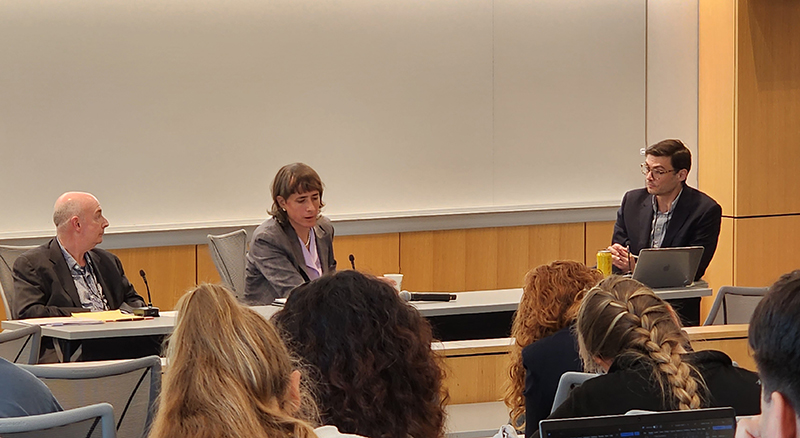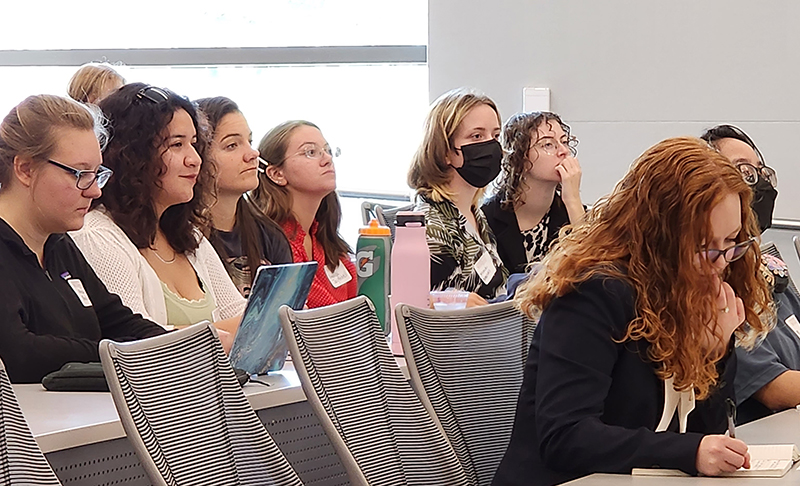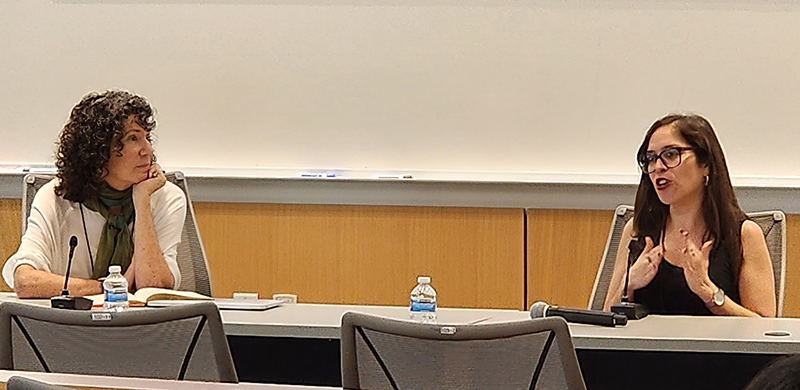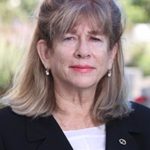 On October 20, students gathered in Charney Hall’s Panelli Moot Court Room for a timely discussion on the conjunction of law and social policy, entitled “Confronting Anti-Abortion and Anti-Trans Laws: Litigation, Legislation, and Policy Surrounding Attacks on Reproductive and LGBTQIA+ Rights.”
On October 20, students gathered in Charney Hall’s Panelli Moot Court Room for a timely discussion on the conjunction of law and social policy, entitled “Confronting Anti-Abortion and Anti-Trans Laws: Litigation, Legislation, and Policy Surrounding Attacks on Reproductive and LGBTQIA+ Rights.”
Hosted by the Center for Social Justice and Public Service, the event featured three panels moderated by Santa Clara Law’s own Professors Michelle Oberman, Evangeline Abriel, and Nicholas Serafin. Guest speakers included: Rafael Langer-Osuna, co-chair of the National Trans Bar Association and Partner, Squire Patton Boggs, San Francisco; Chris Stoll, Senior Staff Attorney at the National Center for Lesbian Rights (NCLR); Melissa Torres-Montoya, Senior Manager of Lawyer Engagement at If/When/How; Aimee Arrambide, Program Officer in Gender Equity and Governance at the William and Flora Hewlett Foundation; Haydee Dominguez, Legislative Assistant to Assemblymember Mia Bonta, California State Assembly; and Sarah Goodman, Senior Legislative Aide to Assemblymember Rebecca Bauer-Kahan, California State Assembly.
Professor Caitlin Jachimowicz, Director of the Center for Social Justice and Public Service, offered welcoming remarks to the assembled students and introduced the first panel, which was moderated by Professor Serafin and featured Mx. Langer-Osuna and Mr. Stoll. The panel touched on many state policies that force the outing of transgender students, ban transgender youth sports participation, and ban LGBTQ curriculum laws. “I feel so much for these kids and for the parents who help them as best as they can,” Stoll notes. “The work that I do is really driven by trying to help them as much as we can and to hopefully fight back against some of this effort which is really being done for very clear and cynical political reasons.”
remarks to the assembled students and introduced the first panel, which was moderated by Professor Serafin and featured Mx. Langer-Osuna and Mr. Stoll. The panel touched on many state policies that force the outing of transgender students, ban transgender youth sports participation, and ban LGBTQ curriculum laws. “I feel so much for these kids and for the parents who help them as best as they can,” Stoll notes. “The work that I do is really driven by trying to help them as much as we can and to hopefully fight back against some of this effort which is really being done for very clear and cynical political reasons.”
Professor Michelle Oberman welcomed the second panel, which featured Ms. Arrambide and Ms. Torres-Montoya and focused on the consequences of U.S. abortion bans. “People are traveling up to thousands of miles, and the procedure and the practical needs to do that have become exponentially onerous,” Arrambide says. “But there always are so many activists out there being iterative to make sure people have access.” Both speakers shared impassioned  words on the laws governing abortion in many states across the country.
words on the laws governing abortion in many states across the country.
The third panel was moderated by Professor Evangeline Abriel and featured Ms. Dominguez and Ms. Goodman, who both likewise touched on issues of birth control and abortion. They shared their experiences in the California State Assembly in passing measures protecting the right to abortion, including AB 1666 (2021) and AB 352 (2023). “For me, it was really great to see the collaboration between legislators—both women and men—to try to make sure that we protect access to abortion in California,” Dominguez comments. “If we’re going to take away some positivity from these panels, it’s that California has really been proactive in this space.”

